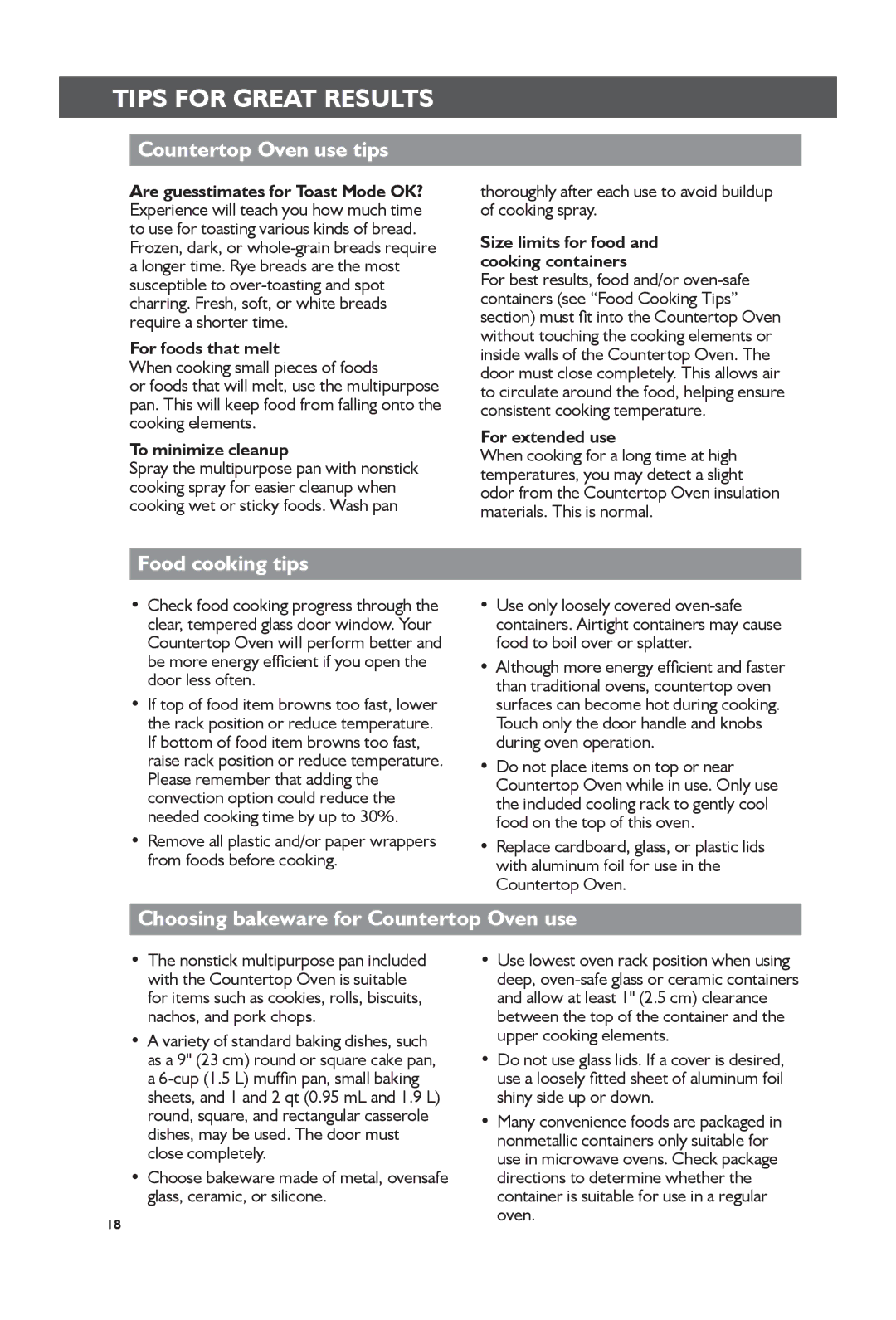KCO273, KCO274
Welcome to the World of Kitchenaid
Scan with your mobile device for recipes, tips, and more
Table of Contents
Countertop Oven Safety
Proof of Purchase & Product Registration
Important Safeguards
Electrical requirements
Voltage 120 VAC Frequency 60 Hz Wattage 1800 Watts
Parts and Features
Parts and accessories
Top
Control panel features
Selecting rack positions
Middle
Cooking Modes Guide
Preheat is not required for Keep Warm, Reheat, Broil modes
Preheat is not required for Toast or Bagel modes
Bake
What is Even-Heat technology?
Cooking Modes
Asado Roast
Broil
Keep Warm
Reheat
Pizza mode tips
Convection tips for Cookie mode
Frozen Mode
Cookie
Toasting Modes
Toast mode tips
Bagel mode tips
Toast
Convection option
Convection Mode Tips
Additional Functions
Frozen option
Before first use
Using the Countertop Oven
Getting Started
10 cm
Adjusting the rack position
Setting a cooking mode
Operating the Countertop Oven
Preheating
Food cooking tips
Tips for Great Results
Countertop Oven use tips
Choosing bakeware for Countertop Oven use
Care and Cleaning
Removing and cleaning the crumb tray
If the problem cannot be corrrected
Troubleshooting
Power on light is flashing rapidly
If your Countertop Oven malfunctions or fails to operate
Warranty
Outside the United States and Puerto Rico
United States and Puerto Rico
Box 218, St. Joseph, MI
Or write to Customer eXperience Centre KitchenAid Canada
Bienvenue Dans LE Monde DE Kitchenaid
Avant la première utilisation Utilisation du four posable
Four Posable Instructions D’UTILISATION
Modes de cuisson Modes Toast toastage et Bagel
Si le four posable fonctionne mal ou ne fonctionne pas
Preuve D’ACHAT ET Enregistrement DU Produit
Sécurité DU Four Posable
Conserver CES Instructions
Spécifications électriques
Volts 120 V CA Hertz 60 Hz Puissance 1800 Watts
Pièces et accessoires
Pièces ET Caractéristiques
Sommet
Caractéristiques du tableau de commande
Sélection des positions de grille
Milieu
Guide DES Modes DE Cuisson
Modes DE Cuisson
Bake cuisson au four
Modes DE Cuisson
Qu’est-ce que la technologie Even-Heat?
Asado Roast rôtissage Asado
Broil cuisson au gril
Keep Warm maintien au chaud
Reheat Réchauffage
Cookie biscuit
Conseils pour l’utilisation du mode Pizza
Vite avec le mode Convection. Vérifier la
Option Frozen produits surgelés
Modes DE Toastage
Conseils pour l’utilisation du mode Toast
Conseils pour l’utilisation du mode Bagel
Toast toastage
Option Convection
Conseils pour l’utilisation du mode Convection
Autres Fonctions
Option Frozen produits surgelés
Mise EN Place
Avant la première utilisation
Utilisation du four posable
Réglage d’un mode de cuisson
Utilisation DU Four Posable
Ajustement de la position de grille
Préchauffage
Conseils Pour DE Bons Résultats
Conseils pour l’utilisation du four posable
Conseils de cuisson
Conseils Pour DE Bons Résultats
Entretien ET Nettoyage
Retrait et nettoyage du ramasse-miettes
Nettoyage du four posable
Dépannage
Si le four posable fonctionne mal ou ne fonctionne pas
Si le problème ne peut être résolu
Garantie
Boîte postale
Aux États-Unis et à Porto Rico
En dehors des États-Unis et de Porto Rico
Bienvenido AL Mundo DE Kitchenaid
Instrucciones DEL Horno Para Mostrador
Prueba DE Compra Y Registro DEL Producto
Seguridad DEL Horno Para Mostrador
Precauciones Importantes
No encaja en el tomacorriente, póngase
Requisitos eléctricos
Voltios 120 VCA Hertzios 60 Hz Vatiaje 1800 Vatios
No use un cable eléctrico de extensión
Piezas Y Características
Piezas y accesorios
Parte superior
Características del panel de control
Selección de las posiciones de la parrilla
Centro
Guía DE LOS Modos DE Cocción
Modos DE Cocción
Consejo para el modo Bake
Modos DE Cocción
Bake Hornear
Información sobre temperatura y tiempo
Broil Asar a la parrilla
Keep Warm Mantener caliente
Reheat Recalentar
Modo Frozen Alimentos congelados
Cookie Galletas
Consejos de cocción por convección para el modo Cookie
Consejos para el modo Pizza
Bagel Roscas
Modos Para Tostar
Toast Tostar
Consejos para el modo Toast
Opción para cocción de alimentos congelados
Funciones Adicionales
Opción para cocción por convección
Cambio de grados Fahrenheit a centígrados
Primeros Pasos
Antes del primer uso
Uso del horno para mostrador
Configuración de un modo de cocción
Funcionamiento DEL Horno Para Mostrador
Cómo ajustar la posición de la parrilla
Precalentamiento
El horno alcance la temperatura deseada, sonará un tono
Consejos Para Obtener LOS Mejores Resultados
Consejos para el uso del horno para mostrador
Consejos para la cocción de los alimentos
Consejos Para Obtener LOS Mejores Resultados
Cuidado Y Limpieza
Cómo sacar y limpiar la bandeja para migas
Limpieza del horno para mostrador
Solución DE Problemas
Si no se puede corregir el problema
La luz de encendido está destellando rápidamente
KitchenAid pagará por lo
Garantía
Duración de la garantía
Siguiente, a su elección
En los Estados Unidos y Puerto Rico
Fuera de los Estados Unidos y Puerto Rico
Para obtener información acerca del servicio en Canadá
Espanõl
W10617644A 06/13

